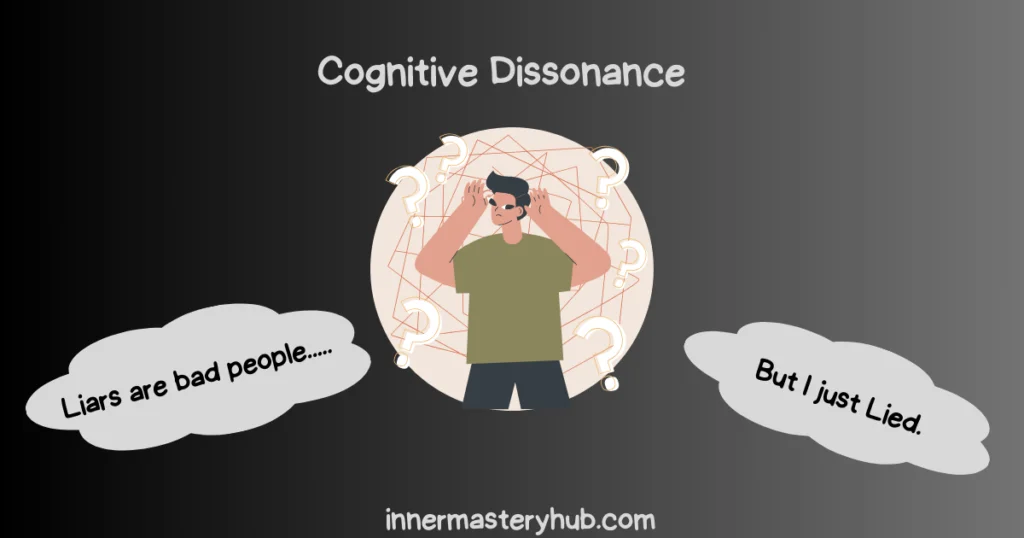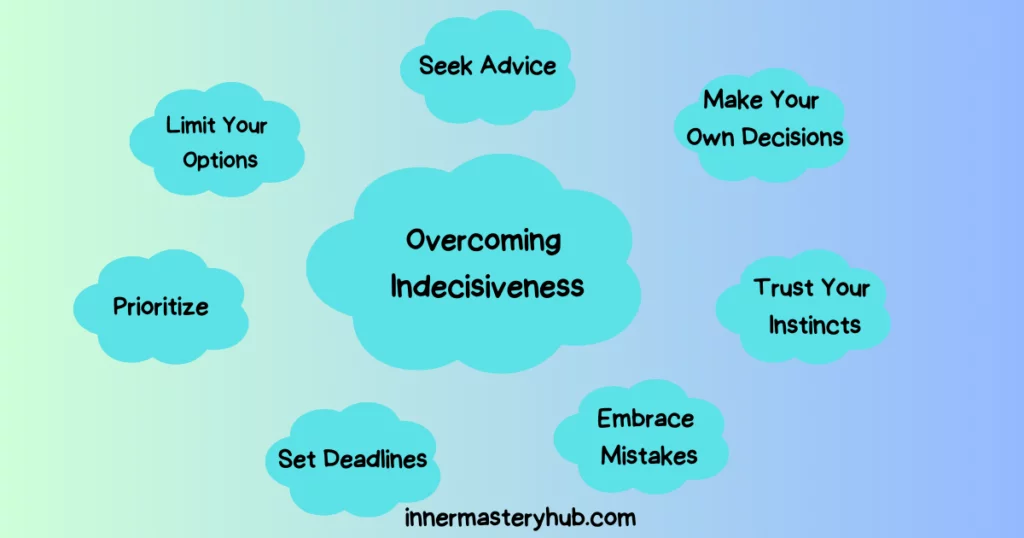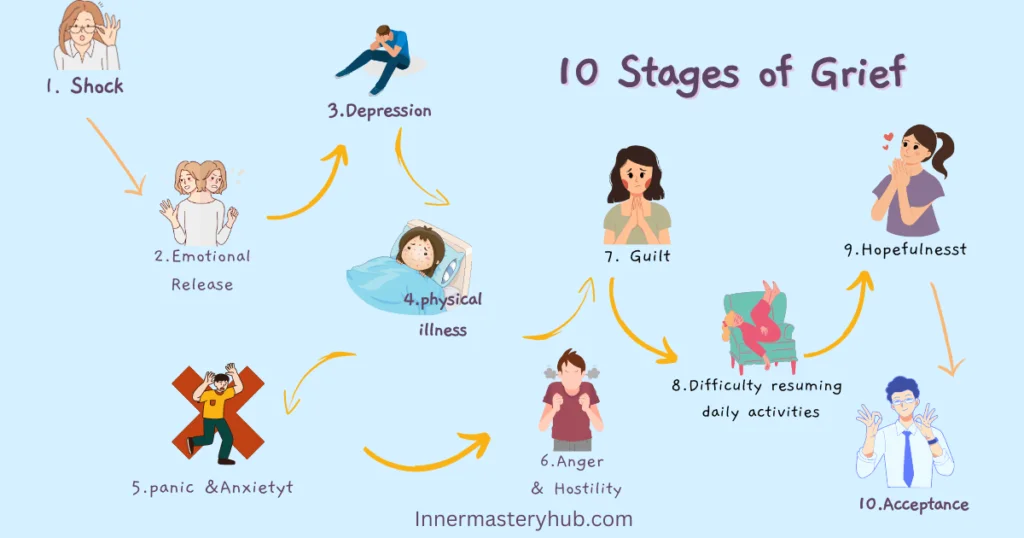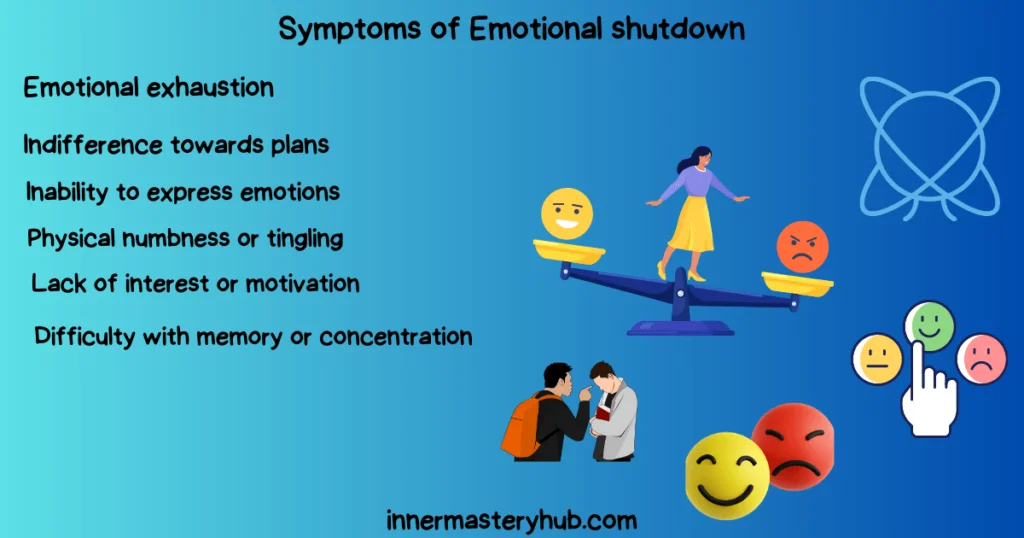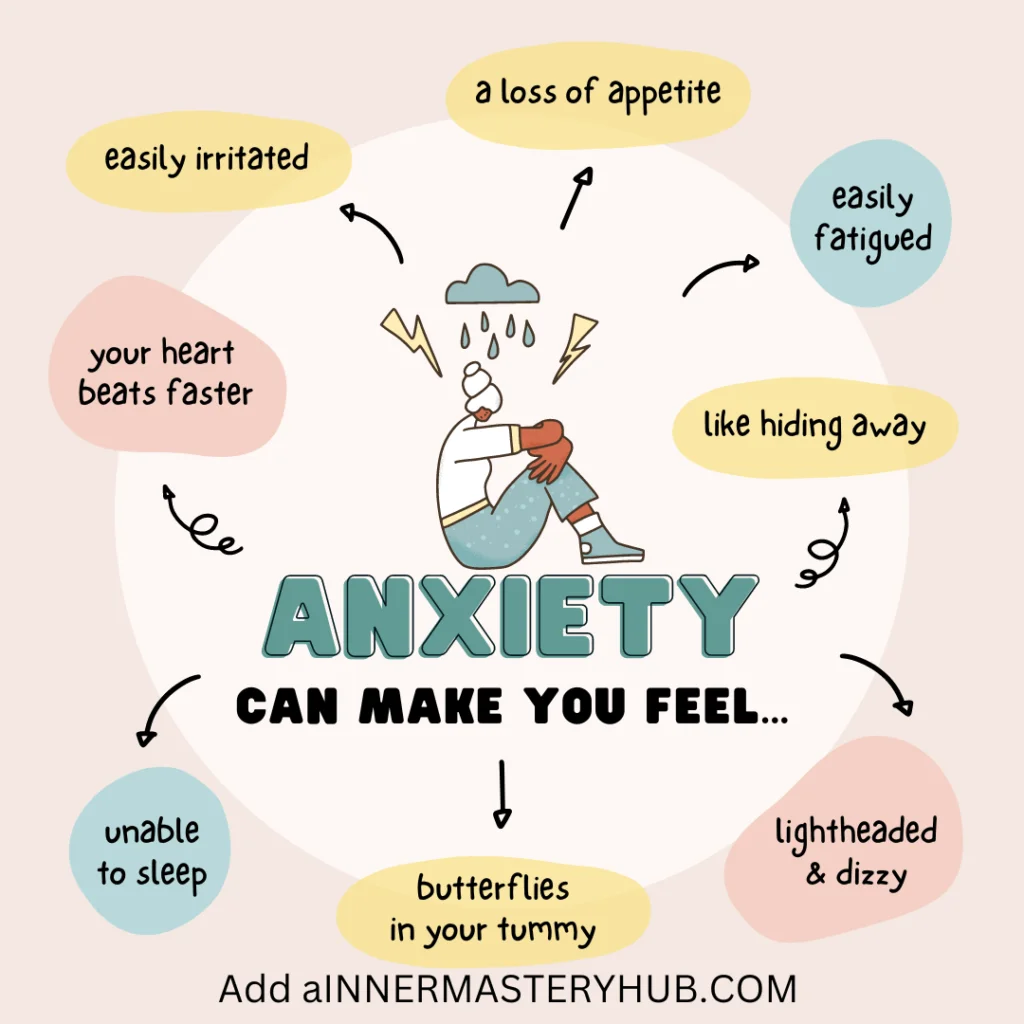
The process of navigating the maze of emotions can be extremely challenging. Whether it’s intuition or worry talking to us is one mystery that frequently leaves us scratching our heads. Are you afraid or is that knot in your stomach a warning sign?
Learning to trust your inner voice and distinguish between the sounds of anxiety and the whispers of intuition is crucial. And it’s an important aspect of growth, I assure you.
Therefore, in this blog post, we will clarify this frequently misinterpreted subject and offer advice and techniques to help you trust your inner guidance while distinguishing between intuition and anxiety. Sounds good? Come on, let’s get started!
Table of Contents
Understanding Intuition
Comprehending intuition involves figuring out the subtle inner voice that frequently directs us when we are faced with a decision. This sense of emotion may not have a rational basis, but it is immensely potent.
Our subconscious allows us to make decisions based on our prior experiences and current situation. Like an internal compass, it gently points us in the direction that, given the facts at its disposal, it believes to be correct.
In many cases, intuition is more important than reasoning. Furthermore, it is essential to our chosen processes and personal development, even though it may not always be correct.
Anxiety engages our fight-or-flight response; intuition is slow and grounded. Anxiety Or Intuition?
Anxiety triggers our natural fight-or-flight response, which is a quick, instinctive response to the dangers we see. This adrenaline-driven state primes us to act right away, which frequently results in prompt but possibly rash decisions.
However, intuition, which comes from a calm, grounded mind, works more slowly. It’s a nuanced process whereby our subconscious mind sorts through our memories, information, and feelings to lead us to deliberate choices that are grounded in comprehension.
Intuition gently guides us toward deliberate decisions, combining intuitive reactions with introspection and either fear or intuition, whereas anxiety pushes us into rash decisions.
Intuition feels confident; anxiety feels unsure or self-conscious. Anxiety or intuition?
You see, intuition originates from a position of clarity and self-confidence. It’s like this self-assured feeling that we all possess. I mean, it’s all about having a good understanding. For decision-making, it provides a solid basis.
Although anxiety is primarily characterized by uncertainty, fear, and self-consciousness, these negative emotions cloud our judgment. We’re anxious and uncomfortable with it, you know? And we may lose sight of our inner wisdom as a result.
Recognizing these various emotions is therefore crucial. When fear impairs our judgment, it helps us discern between anxiety and intuition. It also helps us follow our inner knowledge and pure intuition.
Instinct is a reaction to something our senses prime us.
In contrast to the term intuition, instinct, behavior refers to an instinctive and natural reaction that has been ingrained in us by evolution. It is a response to something that our senses prepare us for. Self-preservation, protection, and survival are linked to these instinctive reactions, which are frequently brought on by outside stimuli.
We are immediately alerted when we hear an unexpected noise at night, for example, or our instinct tells us to rapidly pull away when we touch something hot.
By triggering quick action in reaction to perceived threats, our instincts are made to keep us safe and secure our existence.
In situations where quick decisions are needed, it can be just as crucial to acknowledge and follow our gut feelings as it is to develop our intuition and rational thinking abilities.
Anxiety can feel like it’s coming from you; intuition may feel like it’s coming to you.
Anxiety frequently seems to be coming from within, like a storm building deep within us, causing discomfort, insecurity, and trepidation. However, it appears like intuition comes from outside of ourselves, like a gentle wind leading us.
This voice, which is calm and confident, offers knowledge and wisdom that can light our way forward. Understanding these feelings helps us differentiate between the calm advice of intuition and the internal turbulence of anxiety, which improves our ability to solve problems.
Intuition is guidance your soul leads, while instinct is an innate physical reaction or behavior to stimuli.
The whisper of the soul is intuition, a soft prod from within that leads us with its knowledge and insights. It provides deep understanding and clarity while solving problems, much like a calm and subdued buddy.
However, instinct is our basic survival mechanism, a physical response that happens automatically in response to stimuli. It is a reflexive, instantaneous response that forces us to act quickly in response to necessities or perceived threats. We can actually improve our lives and general well-being as humans by acknowledging and accepting these differences.
Why do some people have excellent instincts?
Through careful study, life experiences, and genetics, some people have developed exceptional intuition and instincts. The way that certain individuals can have enhanced sensory perception due to hereditary factors, which result in more acute instinctive reactions, is remarkable.
Furthermore, personal experiences—particularly those that are stressful or even fatal—have the capacity to gradually hone our intuition. But there’s more!
People who engage in mindful observation are frequently more aware of their environment and their responses, which leads to improved intuitive acuity. Developing good instincts is therefore an intriguing fusion of natural tendencies, life experiences, and cognitive awareness.
This means that instead of thinking every tight chest or lurched stomach is a sign to end my relationship, I’ve taken it as a sign that maybe something more profound is causing some fear to bubble up within me at that moment.
implies that I’ve learned to view every instance of uncomfortable feelings, a constricted chest, or an upset stomach as a warning that a deeper issue may be at work, rather than as a reason to end a relationship.
It implies that I might be experiencing terror at that certain time due to something. I’ve come to view these bodily symptoms as indicators that I need to delve deeper into my sentiments rather than confuse them with anxiety over the state of my relationships.
This viewpoint promotes introspection and personal development as opposed to impulsive responses motivated by transient discomfort and relational anxiety.
I often wonder: even if my intuition were guiding me from a calm and clear-headed place—would I hear it?
I frequently ponder whether I would notice my intuition even if it were coming from a serene, rational place. Can I distinguish its subtle hum from the clamor of my busy emotional and mental landscape? It is a question worth considering and addressing.
It takes cultivation rather than birth to be able to recognize our instincts and women’s intuition in the middle of life’s chaos. To engage in profound introspection, one needs perseverance, practice, and resolve.
In order to allow our woman’s intuition to thrive, we must create a calm environment within ourselves and tune our senses to pick up on its tiny cues. Will you be able to listen to that inner voice the next time it whispers?
Intuition feels confident; anxiety feels unsure or self-conscious.
The way that worry and intuition affect us is another crucial difference. In general, intuition is accompanied by a feeling of assurance and confidence.
An underlying sense of rightness is always present when intuition feels like a course of action or conduct that appears dangerous or out of the ordinary. “This is the way,” it says in a steady, quiet voice. Believe me.
Conversely, worry often causes us to feel uncertain, self-conscious, and dubious of our nervous systems. The voice is more akin to a frenzied, scared one that is always asking, “What if this falls apart? If that occurs, what will happen?
Our imaginations are filled with worst-case scenarios and possible disasters when we are anxious, which makes us question our choices and ourselves. It causes us to overthink and question our skills by feeding into our anxieties and insecurities.
Knowing how each feels can help you tell the difference between intuition and anxiety. The next time you get that nagging gut feeling, stop and consider: Is it more like the restless doubt of anxiety or the serene confidence of intuition?
Intuition Is Specific to the Individual, Whereas Instinct Is Shared by All Members of a Species
Despite being frequently discussed in general terms, intuition feels like something personal. Each of us has different experiences, perceptions, and thought patterns that influence it. This individual background affects how we receive and understand the signals from our intuition.
For some people, intuitive insight may come as a spontaneous thought or idea, while for others it may be a gut feeling. No matter how it manifests, intuition feels incredibly individualized and reflects our past experiences and paths.
All individuals of the species, on the other hand, share instincts and behavior. It is an innate, biologically hard-wired response that is intended for survival rather than being the result of personal experiences or emotional reactions.
For example, when a turtle hatches, it automatically moves toward the water, and birds know that they should fly south for the winter. The species is protected and its survival is guaranteed by these deeply rooted, unlearned reactions. Beyond individual variance, it is a natural and universal impulse.
It is essential to comprehend this distinction to distinguish between anxiety or intuition and instinct and gut feeling. We may make better decisions and foster our development as we gain the ability to recognize the causes of our feelings and responses.
Instincts more primal and focused primarily on survival
By their very nature, instincts are primitive and focused on surviving. After millennia of evolution, they are hardwired into our DNA and originate from our most fundamental biological structures. Animals are motivated to defend their young, obtain food, or escape from predators by these strong, natural reactions.
These instincts can show up in humans as things like jumping at a loud noise or experiencing a quick burst of defensive strength when faced with danger. These reactions happen, solely focused on protecting life and safety, without any planning or analysis. They are our body’s natural defense mechanisms, intended to keep us safe and secure our existence.
When I see other people talking about how they feel connected to their intuition, I feel a twinge of envy and inspiration.
It always makes me feel a little envious when I hear someone talk about how well they connect with their intuition. But rather it is a crippling feeling of jealousy, it’s a subtle reminder of things I want to achieve.
At the same time, I am inspired by these discussions and am driven to further explore my path of self-awareness. They are striking reminders of the possibility and great rewards of cultivating a positive relationship with our intuition. I am motivated by them to develop patience, listen, trust, and—perhaps most importantly—have faith in the strength and existence of my inner voice.
That’s why this article was even MORE critical for me to write—to get these thoughts I am feeling out into the universe and out of my mind.
Writing, or putting these thoughts on paper, is a cathartic release that gives my deepest thoughts a voice and brings clarity to the turmoil. It’s a personal investigation of who I am, a contemplative path that stimulates development and cultivates a better understanding of my emotional and mental terrain.
Intuition feels like Conscious Reasoning, Whereas Instinct Does Not
Unlike instinct, intuition incorporates a component of cognitive reasoning. Intuition functions more subtly than intuitive responses, which are instantaneous and automatic reactions derived from basic survival systems. It is a reflexive response and a sophisticated interaction between emotion and thought.
It seems as though our subconscious mind has digested data, considered possibilities, and made a decision without our conscious knowledge when we have intuitive insight. This choice then manifests as a “gut feeling” or epiphany in our conscious minds.
One complex cognitive process that integrates our experiences, knowledge, and feelings to portray the world and its implications in a way that might seem almost magical is intuition. This element of conscious reasoning distinguishes intuition from feeling, instinct, and conduct and offers a more profound understanding of our choices and behaviors.
Intuition is soul-led guidance, while instinct is an innate physical reaction or behavior to stimuli.
Soul-led guidance, or intuition, is an inner voice that gives us direction and understanding. Using our deepest perception goes beyond the material. Even when the way is uncertain, trust and surrender are necessary to follow its instructions.
In contrast, instinct is a gut-based bodily response to stimuli that are motivated by survival. You don’t have to think about it. We are protected by instinct, such as the urge to fight or run or the instinct to remove our hands from a hot stove.
Intuition and instinct have different origins and objectives. Our spiritual guidance comes from intuition, and our bodily health is protected by instinct.
Intuition is always experienced in the present moment.
At its core, intuition is a contemporary phenomenon. It shows itself as early realizations, intuitions, or “gut feelings” that come up during the immediate experience. As opposed to thinking back on the past or worrying about the future, intuition works in the “here and now.”
A brief glimmer of wisdom demands our attention, beckoning us to acknowledge and follow its direction. Because of its innate immediacy, intuition is a potent instrument for decision-making, situational response, and forward motion that is based on the realities of the here and now.
How do you know if it’s intuition or overthinking?
It might be difficult to tell the difference between overthinking and intuition and instinct. Overthinking frequently results from uncertainty or fear and feeds a vicious cycle of incessant analysis, which causes tension and bewilderment.
Contrarily, intuition feels like the spontaneous, serene realization that is clear and gives one a sense of assurance without requiring a lot of cerebral work. It has a deep, gut-level feeling.
Intuition is silent, fleeting, and profound, but overthinking is loud and constant. You can tell if your intuition feels like overanalyzing and making poor decisions by looking for these traits.
Intuition is a higher sense of perception.
The ability that connects our conscious mind to a higher plane of awareness is intuition, which is frequently referred to as the “sixth sense.” By utilizing a vast reservoir of knowledge that beyond conventional sensory input, it goes beyond our concrete experiences.
By enabling us to notice details that are usually missed, this intuitive awareness helps us make choices that are consistent with who we really are.
Despite logic and reason, intuition feels like an inner compass, guiding us through life’s maze with a sense of confidence. It is a whisper from our spirit that directs the cacophony of the outside world.
Intuition is a way of growing, connecting, and taking power.
The internal compass that directs our development and helps us connect with our deeper selves is intuition. We empower ourselves and make choices that are in line with our true selves as we develop the ability to access this intuitive wisdom.
Determining our intuition feels like acknowledging our inherent potential fosters a strong bond with our spiritual core. Therefore, following our intuition is a way to learn more about ourselves, support personal growth, and realize our unique potential.
Can intuition cause anxiety?
Usually, anxiety isn’t directly caused by intuition. Anxiety can cause worry if it is confused with relationship stress or intuition. In contrast to anxiety, which produces uncertainty and fear, intuition is a serene, leading voice that fosters trust.
When anxiety is mistaken for discernment, needless suffering can result. Stress can also be caused by fearing the results of trusting our intuition. Reducing anxiety and promoting personal development requires an understanding of instinct or anxiety and how it differs from pressure.
Why do some people have excellent instincts?
Some people have a talent for making decisions almost instinctively; they act on an eerie, innate capacity to make the “right” decisions, frequently without being cognizant of the reasoning behind them. Numerous things could be the cause of this inclination.
Although everyone has fundamental survival instincts, people who have strong instincts have probably refined their intuition via exposure to a variety of situations and repeated encounters, which has helped them accumulate a wealth of subconscious knowledge.
They have a good sense of observation and frequently see patterns and subtle clues that others might miss.
Their innate decision-making is informed by a mental database that is gradually formed by this abundance of observed and experienced material.
Because they may be more in tune with their inner selves, these people are more prone to trust and follow their instincts without letting reason override them.
Understanding and managing one’s emotions is known as emotional intelligence (EI), and it can also be very important for improving one’s intuition.
Practice self-compassion
The practice of self-compassion entails kindly acknowledging your emotions. It entails permitting yourself to grow, make mistakes, and be flawed. Rather than being your worst critic, turn into your greatest ally, offering consolation and encouragement when things get tough.
Learn more about intuition.
We must acknowledge intuition’s multifaceted nature to comprehend it completely. Our experiences, perceptions, and cognitive processes are all involved in this continuous process, which is not a one-time event. The subconscious mind uses intuition to communicate with the conscious mind, providing deep insights that go beyond reason.
In psychology, intuition feels like having prior information and experiences. In order to provide intuitive insights, our brain naturally and swiftly connects disparate pieces of knowledge and experience. However, we frequently don’t know about this procedure.
Emotional intelligence, or the capacity to comprehend and control emotions, is intimately related to intuition. Because they are sensitive to their inner states and can decipher body and mental cues, people with strong emotional intelligence also have enhanced intuition.
Intuition has a spiritual component as well. In order to achieve more inner peace, several traditions place a strong emphasis on its growth. They contend that we can access deeper, more universal knowledge through intuition.
Harnessing intuition feels like trusting gut instinct and intuitive feelings alone. It involves cultivating awareness, emotional intelligence, and openness to the insights of the subconscious mind. It’s about balancing our rational and intuitive minds on life’s journey.
How can we balance instinct and intuition with rational thinking in decision-making?
It takes skill and awareness to strike a balance between rational thought and instinct and intuition when making decisions. It begins with recognizing the importance of analytical reasoning and intuitive insights in decision-making.
A type of knowledge that goes beyond critical thinking is typically provided by intuition and instinct, which frequently provide us with quick, gut-level reactions to circumstances.
We may examine circumstances objectively, weigh the advantages and disadvantages, and consider many viewpoints when we use logical thinking. The difficulty is in successfully combining these two strategies.
Using instinctive or intuitive thoughts as a starting point and then using logical reasoning to validate them is one method of striking this equilibrium. Instead of responding to an intuitive feeling right away, we can take a moment to consider its potential ramifications using reason. This means using reason and logic to strengthen our intuition rather than questioning it.
Similarly, when we have a strong commitment to logical analysis, it can be helpful to take a step back and follow our intuition or gut reactions. This method makes sure we don’t miss any important details or ideas that our subconscious could be attempting to convey.
A useful and beneficial strategy in this process is developing mindfulness. Gaining self-awareness makes us more sensitive to our intuition feels like being able to distinguish it from emotional responses or wishful thinking.
Concurrently, mindfulness fosters a calm and composed mental state that creates an atmosphere that is favorable to rational thought.
Effectively integrating both intuition and instinct into our decision-making process is more important than picking one over the other. It’s about using our entire cognitive range to make well-rounded choices that speak to both our innermost selves and pragmatic realities.
I had much to learn about love and relationships, and with new information, I could reason with myself much differently.
For instance, I discovered that love and interpersonal connections are more than just emotional bonds after learning more about them. They entail ongoing education, development, ingenuity, and compromise.
I started to think differently after gaining this new understanding of past relationships, embracing both emotional intuition and logical reasoning to navigate my future relationships and life.
Making choices based on your genuine feelings rather than what other people believe or anticipate is the key to pursuing authenticity. It’s about respecting your own wishes, values, and views, even if they conflict with those of society or the preferences of the majority of those around you.
Anxiety in relationships can cloud our judgment, leading to ambiguity and doubt. Being able to distinguish between the chaos of worry and the serene direction of intuition feels like to navigate relationships with greater assurance and make well-informed judgments.
As you strike a balance between being true to yourself and fitting in, this journey requires courage, conviction, and self-awareness. Every decision you make moves you one step closer to your ideal self. You can achieve true freedom and fulfillment by being true to yourself, therefore embrace the power of authenticity.
RELATED POSTS
Why Does Absorbing Other’s Energy Amplifies Psychic Fatigue?
Overcome Negativity by Reframing Your Thoughts in 6 Steps
Overcome Negativity by Reframing Your Thoughts in 6 Steps

